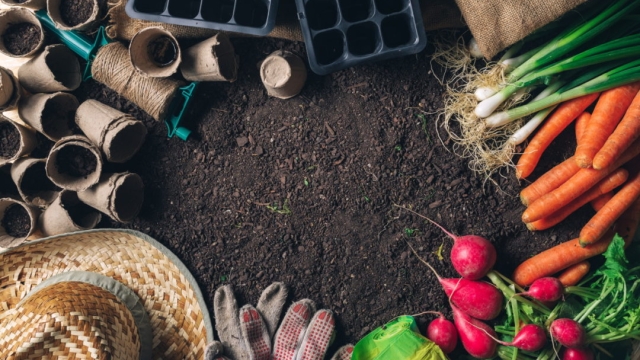
Greetings fellow green thumbs! Today, we embark on a journey into the wonderful realm of organic gardening. As nature lovers and lovers of wholesome, pesticide-free produce, we take pride in cultivating our own little patches of green paradise. Organic gardening is not merely a trend but a way of life, promoting sustainability, biodiversity, and a deep connection with the earth. In this article, we will delve into the principles, techniques, and rewards of organic gardening, as well as discover the secrets behind the success of ‘Kellogg Garden’ Products, a remarkable family-owned company rooted in a rich history spanning four generations. So grab your gardening gloves and join us in unearthing the wonders of organic gardening!
Benefits of Organic Gardening
Organic gardening offers a multitude of benefits that go beyond just growing your own food. By ditching synthetic fertilizers and chemical pesticides, organic gardening promotes the health and well-being of both plants and humans. Let’s explore some of the key advantages of embracing an organic approach to gardening.
First and foremost, one of the major benefits of organic gardening is its positive impact on the environment. By making use of natural and sustainable practices, organic gardeners help preserve the delicate balance of ecosystems. Avoiding harmful chemical inputs not only ensures the health of the soil but also protects nearby water sources from contamination. This environmentally friendly method promotes biodiversity and contributes to the overall well-being of our planet.
In addition to being eco-friendly, organic gardening also enhances the nutritional value of the produce. By nourishing the soil naturally, organic gardeners ensure that their crops are rich in essential nutrients. Organic fruits and vegetables often have higher levels of vitamins, minerals, and antioxidants, which are beneficial for our health. By consuming these nutrient-dense foods, we support our own well-being and contribute to a healthier diet.
Another advantage of organic gardening is the protection it offers against harmful chemicals. While conventional gardening methods rely on synthetic fertilizers and pesticides, organic gardening prioritizes natural alternatives. This means reduced exposure to toxic substances for both the gardeners and the consumers of the produce. Organic gardening provides a safer and healthier environment for everyone involved in the process.
In conclusion, organic gardening is a sustainable and eco-friendly practice that brings about a plethora of benefits. From promoting environmental health to enhancing the nutritional value of produce and ensuring a safer growing environment, organic gardening is a win-win for both nature and humans. By embracing organic gardening methods, we can contribute to a greener future and enjoy the many advantages it offers.
The History of Kellogg Garden Products
Kellogg Garden Products, a family-owned and operated company, has been a prominent figure in the world of organic gardening for over four generations. With a rich heritage and deep-rooted principles, they have become a trusted name among avid gardeners.
Starting from humble beginnings, Kellogg Garden Products was founded with a vision to provide gardeners with high-quality organic materials blended with sustainable practices. Their commitment to the environment and innovative techniques has set them apart in the industry.
Zone 6 March Planting
Throughout the years, Kellogg Garden Products has continuously evolved and expanded their product offerings. They have introduced a wide range of organic soils, fertilizers, and other gardening essentials, tailored to meet the specific needs of different plants and garden types.
Today, Kellogg Garden Products continues to thrive as a leader in the organic gardening market. Their dedication to quality, sustainable practices, and customer satisfaction has solidified their position as a go-to brand for both novice and experienced gardeners alike. With their deep-rooted history and unwavering commitment, Kellogg Garden Products is set to continue shaping the future of organic gardening.
Tips and Techniques for Successful Organic Gardening
Creating a thriving organic garden requires a bit of knowledge and a lot of love for the plants. Here are some tips and techniques to help you achieve success in your organic gardening endeavors.
Start with healthy soil: The foundation of any successful organic garden lies in the quality of the soil. Prioritize enriching your soil with organic matter like compost and well-rotted manure. This will improve its structure, fertility, and overall health, providing a conducive environment for your plants to grow.
Practice companion planting: Maximize the productivity of your garden by utilizing companion planting techniques. Certain plants have natural affinities for one another and can benefit from being grown together. For example, planting marigolds alongside tomatoes can help repel pests and attract beneficial insects, creating a harmonious and pest-resistant ecosystem.
Implement organic pest control methods: Instead of resorting to chemical pesticides, embrace organic pest control methods to maintain a balanced and thriving garden. Introduce predatory insects like ladybugs or lacewings to control pest populations or use organic pest sprays made from ingredients such as neem oil or garlic. Regular monitoring and early intervention will help prevent pest outbreaks and minimize damage to your plants.
Remember, organic gardening is a journey of continuous learning and adaptation. Experiment with different techniques, listen to your plants, and make adjustments as needed. By following these tips and techniques, you will be well on your way to achieving a flourishing organic garden.
